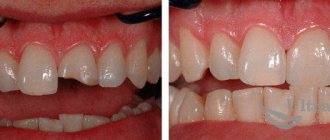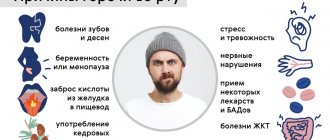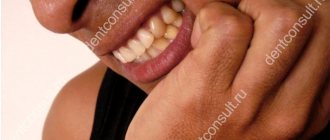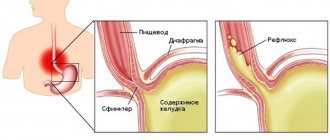The main signs of a chip are pain and a sharp increase in tooth sensitivity (hypersthesia). If the enamel is damaged, a reaction to cold and hot occurs. When a nerve is exposed after a chip or the pulp chamber is damaged, pulpitis develops. Remember that if part of a tooth breaks off, the pain cannot be overcome by rinsing with herbal decoctions or taking medications. It is necessary to contact your dentist as soon as possible.
Differences between a chipped tooth and other types of damage
In dentistry, a chipped tooth is any type of mechanical damage leading to disruption of the anatomy and structure of tissues. Experts have different interpretations of this concept. For example, you can find diagnoses such as “chipped the tooth wall below the gum level” or “chipped the tooth wall under the gum.” However, in the classical sense, this is damage to the coronal part (in other words, a chipped tooth crown). Trauma does not imply its loss or change in position relative to the jaw and damage to the ligamentous apparatus. You should also distinguish between chips and root fractures, since in the second case the damage affects the root part. In this case, combined injuries also occur, when, for example, a chip of the crown part and tooth dislocation are diagnosed at the same time.
What to do before visiting a doctor?
What to do if a piece of a tooth breaks off? First of all, make an appointment with a dentist.
But until you see a specialist, you can take some measures to get rid of the pain and consequences. These include:
- rinsing the mouth with warm water or a weak saline solution. This will remove food particles and the actual tissue of chipped enamel from the oral cavity. If a doctor’s appointment is not scheduled for the near future, it is better to repeat rinsing 2-3 times a day;
- You should not avoid hygiene procedures - it is important to brush your teeth, being careful at the site of damage;
- if the damage is serious, save the broken piece: with its help, the doctor will be able to easily restore the shape of the crown;
- taking painkillers - give preference to an analgesic that has already been taken before and to which there are no allergic reactions. But you shouldn’t get carried away with it, take the recommended dose and go to the clinic;
- if the sharp edges of the chip damage the mucous membranes, try to disinfect them - rinse your mouth with an antiseptic solution;
- If tooth mobility is observed due to severe damage, try to fix it in the correct position by clenching the jaws. You should not be zealous, it is important to be careful. Loosening may indicate a root fracture, so a cold compress will not hurt - apply it externally.
Causes
- Dental trauma. Falls and impacts are the main reason why chips and cracks occur in perfectly healthy teeth;
- Negligence towards one’s health and bad habits (opening beer bottles with teeth, cracking hard nuts with them, gnawing hard objects, etc.);
- Demineralization of tooth enamel. A process that leads to weakening of enamel and increased risk of injury;
- Carious lesions. They damage the structure of enamel and dentin and thereby make the tooth more vulnerable to mechanical stress. Depulpation completely “kills” the tooth: the tissues, not receiving nutrition from the pulp, become very fragile;
- Bite abnormalities. Cause improper load distribution, which increases pressure on individual teeth or areas of the dentition;
- Incorrect filling. Due to an incorrectly installed filling, the chewing tooth often chips;
- Poor nutrition and poor hygiene. An indirect cause that affects dental health in general;
- Weakened immunity, bad genetics.
Why does a broken tooth need to be restored?
Doesn't it bother you that a piece of your tooth has broken off and you're not going to see a dentist? Be aware that a chip can cause a number of related problems. The most common of them:
- increased tooth sensitivity (reaction to cold and hot)
- infection of the pulp (nerve endings)
- further tooth decay
A timely visit to the dentist will save you from these and other problems that may arise due to a chipped tooth. A good doctor always knows what to do if a tooth is broken and will select the right method for its restoration, taking into account the specifics of the case. The restored tooth will regain its natural shape and perform its functions.
Classification of chips
| Types of chips | Description |
| Chip of tooth enamel | The easiest type of chipping, in which only the enamel structure is damaged. These could be cracks or a small chip in the tooth. There is no pain, but lack of treatment can worsen the situation. In addition, even a small chip on a tooth has a negative impact on aesthetics. |
| Dentin chip | As a result of mechanical stress, the dentin layer is damaged. The most common types of such injuries are chipped tooth walls on molars and chipped front teeth. In addition, untreated chips and cracks in the enamel can subsequently worsen and reach the pulp. |
| Severe chipped tooth | These are serious cracks and fractures that significantly damage the crown part of the tooth. Sometimes a tooth splits, when it seems to split into two parts, which severely injures the pulp and dentin. Such chips require long and complex treatment. |
Consequences of injuries
Despite following measures at home, a late visit to the doctor can result in some complications:
- infection of the pulp, development of inflammation, severe pain;
- increased tooth sensitivity;
- root fracture, inflammation of periodontal tissues;
- tooth mobility, high risk of loosening and loss;
- violation of the correct closure of the jaws;
- formation of cysts, granulomas as a result of the inflammatory process.
In order to eliminate dangerous consequences, it is important to take an x-ray. If serious violations are detected, the doctor will prescribe treatment and take measures to prevent consequences.
Restoring a chipped tooth
Most patients after mechanical damage have a logical question: how to fix a chipped tooth? The treatment method for chipped teeth depends entirely on the type and degree of damage. Today, technology makes it possible to restore a chipped tooth of almost any severity, but this requires resorting to complex and expensive therapeutic and orthopedic procedures.
| Problem | Description of methods |
| Light chips and cracks (treatment of chipped tooth enamel) | For minor enamel cracks, mineralization and fluoridation are used to restore its protective functions and prevent the cracks from deepening. For minor damage, filling is usually not required. If there is no risk to functionality and aesthetics, then the doctor suggests grinding down the chipped tooth. |
| Moderate chips | If the damage has affected the dentin, then filling is no longer possible. The same can be said about severe chips and cracks in the enamel. Often, chipped teeth are built up with composite materials and restored with inlays. |
| Heavy enamel chips. | If the pulp has been affected, then before starting to restore the chipped tooth, it is necessary to carry out endodontic treatment with removal of the pulp and filling of the canals. In case of chips under the gum and deep clefts of the tooth, its complete or partial removal with subsequent installation of a crown or implant may be indicated. In situations where a large part of the tooth is missing, installing veneers and inlays is almost impossible. |
Example 3. Chronic periodontitis, significant root exposure, tooth mobility
If chronic periodontitis (periodontal disease) is accompanied by significant loss of bone tissue (more than ½ of the root length), tooth mobility, and exposure of root bifurcations, tooth extraction is the only possible solution to the problem.
In the case of periodontal disease, the main problem is the presence of periodontal pockets and loss (atrophy) of the bone tissue around the teeth. The roots are gradually exposed, and tooth mobility appears. If the periodontal pockets are so deep that even periodontal surgery cannot solve the situation, it is necessary to remove such teeth, because Millions of microbes accumulate in the pockets, which further “corrode” the bone. It is better not to wait until the teeth fall out on their own, but to remove the source of infection, thereby preventing further loss of bone tissue and leaving the possibility of implantation.
Chipped front tooth
The chips on the front ones need to be mentioned separately, since the treatment here is aimed at restoring aesthetics. A small chip on a front tooth can be corrected with grinding. In case of noticeable chips of enamel and dentin, the chipped front tooth is built up using filling materials or veneers are installed. For more severe damage, crowns are installed. Usually these are products made of ceramics or zirconium, since metal ceramics are less aesthetically pleasing and can oxidize. If a tooth has chipped under the gum or has split into two halves, most often the patient is offered removal and installation of an implant. Restoration requires the use of a certain type of filling that meets high aesthetic requirements. Most often, photopolymer or compomer fillings are used to treat a chipped front tooth.
Selection of material for restoration
For direct tooth restoration, special composite materials are used, which have high strength, ductility, and also help achieve the effect of tooth transparency.
Most popular materials:
- Filtek (USA) - considered a universal material. It is suitable for restoring anterior teeth and chewing teeth. The main thing is to choose the right shade.
- Venus (Germany) is a more expensive option for the restoration of anterior teeth. The material consists of nanoparticles, which helps to achieve maximum aesthetic effect.
- Enamel Plus (Italy) - sometimes it is called a “chameleon” for its ability to adapt to its native enamel color.
- During indirect restoration, ceramics, zirconium dioxide, and metal ceramics are used.
Prevention of chips of enamel and tooth wall
Dental injuries are usually sudden, so it is quite difficult to insure against them. However, preventing chips does not consist only of wearing protective mouthguards. It has already been said that dental health is influenced by many factors, including hygiene and proper nutrition. This is where you should start if you want to keep your teeth strong and healthy. Indirect causes should also be addressed. If you have an overbite or bruxism, start receiving appropriate treatment as soon as possible. Get rid of the bad habit of gnawing on foreign objects, be careful with solid foods, especially seeds and nuts. If you have naturally weak enamel, use products to strengthen it. Remember that you are given one permanent set of teeth for life, so taking care of its preservation is our direct responsibility
Publisher: Expert magazine about dentistry Startsmile.ru
Author of the material: Yaroslav Ikonnikov
Means for strengthening enamel at home
You can strengthen the enamel layer at home using products that contain fluoride. These can be either regular strengthening toothpastes or special products, for example, fluoride-containing enamel varnishes. The frequency and characteristics of the use of certain drugs depend on their composition and properties.
Important! It must be remembered that fluoride in large quantities can have a negative effect on the body. Therefore, you should use products containing this substance only in accordance with your doctor’s recommendations.
Alternative methods
An alternative to direct restoration of a chipped tooth with composites is the installation of orthopedic structures, which are made in the laboratory from individual impressions.
Types of orthopedic structures for restoration of chipped teeth:
- veneers are thin ceramic plates that are glued to the outer part of the frontal units; they withstand mechanical loads well and perform a protective and aesthetic function;
- inlays are individual ceramic onlays that are used when restoration of a chipped tooth is no longer possible, but circular turning of the unit for a crown can be avoided;
- crowns are structures in the form of a cap made according to the shape of a tooth, they are fixed to a pre-turned unit, suitable for installation on chewing and anterior teeth when they are severely damaged; installation of crowns requires stronger turning of healthy tissues than composite restoration of a chipped tooth, and the cost of installation crowns higher.










